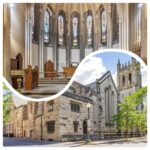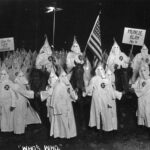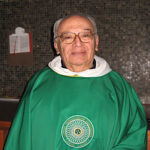In defending his denomination, the Episcopal Church, the Rt. Rev. C. Franklin Brookhart, Jr. was not always truthful in the ecumenical greetings he brought to the global United Methodist Council of Bishops meeting in Lake Junaluska, North Carolina last Thursday.
Bishop Brookhart, who leads the Diocese of Montana, also shared some very basic structural info about his denomination.
While the Episcopal Church is known as a rapidly dying and extremely liberal church, and Bishop Brookhart noted to his UMC colleagues that “[s]ome of you have told me we are ultra-liberal,” he “would assert the Episcopal is not a liberal church as the secular press uses” such terms.
Of course, I recognize that there are a (dwindling) number of faithful Christians still within the Episcopal Church, and that even a tiny minority of the denomination’s 109 dioceses have theologically orthodox leadership. And there are also growing numbers of faithful Christians who were Episcopalian at some point in the past.
Bishop Brookhart, however, was not speaking about such individual exceptions, but rather about his denomination as a whole.
For his part, the leader of Montana Episcopalianism would not mind the “liberal” label if it simply signified being “open” to “new horizons” but insisted that his church was not “crazy” in its theology or practice.
Bishop Brookhart suggested that that label was “solely because of our stance on human sexuality.” He noted that his church’s stand is different from the UMC’s, adding “at this point” in a not-so-subtle nudging for his hope for the UMC to abandon our official support for biblical standards of sexual self-control. However, he claimed that the Episcopal Church’s position was “highly nuanced,” since the new, “experimental” official ritual for blessing same-sex unions “carefully avoids the word marriage.” Bishop Brookhart volunteered that he had personally authorized the use of this rite in his diocese for gay couples (as long as there was strong support, education, and counseling from the congregation) as well as older people in nursing homes desiring a non-marital union. In full disclosure, the Montana bishop also shared that he has a lesbian daughter, which he used as a basis to briefly tout the pro-homosexuality position.
Beyond that, Bishop Brookhart insisted that the Episcopal Church was “a theologically orthodox church,” and in fact was “yawningly, boringly orthodox.” “We believe passionately in the Trinity,” he said. He even very broadly claimed that within his denomination, “[n]o one has been talking about changing the creed” and “[n]o one has been talking about changing the person or work of Jesus.”
If only that were true.
Listing all the well-documented, recent counter-examples to Bishop Brookhart’s rather strong factual claims would likely take an entire book, so a few examples will have to suffice.
I do not know what sort of things Bishop Brookhart thought would cross the “theologically crazy” line for United Methodists. But surely this is not a meaningful category if it does not include Episcopal priests being affiliated with a neo-pagan druid order or the Episcopal Church’s Women’s Ministries Office promoting for explicitly pagan goddess worship in Sunday services, even to the point of honoring deities whose cults are explicitly condemned in the Old Testament. To be fair, I recall that after IRD’s initial reporting, at least one of the Episcopalian druid-priests faced some accountability, though there appeared to be no consequences for others involved in what became known as the “Episcopagan” scandal. It is worth noting that this all took place after Brookhart had become a bishop.
Meanwhile, it is hard to know where to begin with Bishop Brookhart’s strong assertions about the theological orthodoxy of his denomination. His fellow Episcopal Church bishop, John Shelby Spong (now rather actively retired) remains in good standing despite his very fundamental attacks on Scriptural authority and basic Christian doctrine of the Nicene and Apostles Creeds. As my colleague Jeff Walton reported, Spong used a Good Friday service this year to undermine belief in the Trinity, denounce the Nicene Creed as “a radical distortion of the Gospel of John,” argue that the four biblical gospels are historically unreliable, deny that people are “sinners,” and decry as “barbaric theology” traditional Christian teaching about forgiveness of sin coming through Christ’s sacrifice on the cross. This is the same John Shelby Spong who wrote the book with the title argument, Why Christianity Must Change or Die. And the same John Shelby Spong who authored The Sins of Scripture: Exposing the Bible’s Texts of Hate to Reveal the God of Love. A couple of lines from the Publisher’s Weekly review of the latter volume is worth quoting here:
Some “biblical texts, according to Spong, are not the incontrovertible Word of God, but flawed human responses to perceived threats. An incendiary example of this is Spong’s assertion that Paul was a closeted gay man whose anti-gay statements were motivated by little more than his own self-loathing. Spong does not stop there; in the course of the book he suggests that Jesus and Mary Magdalene were married; that none of the supernatural events described in the Bible took place (including the resurrection); and that theism itself is a misunderstanding of God.”
All this from Brookhart’s fellow bishop in good standing, who arguably remains the denomination’s best-known cleric.
With such theological radicalism flowing freely at the highest levels of denominational leadership, one would be hard-pressed to argue how Bishop Brookhart was being remotely truthful in strongly insisting that his was a such a theologically orthodox and traditionalist denomination in which “no one” was challenging the creed or redefining the person and ministry of Jesus Christ.
It strains credibility too far to believe that Bishop Brookhart is utterly unaware of such currents in his own church. But perhaps he was just eager to push forward the ill-advised full communion agreement being considered by the two denominations, and was counting on his United Methodist colleagues being too overwhelmed with their own affairs to have time for anything more than taking his word for it on the Episcopal Church’s alleged orthodoxy.
With such leadership, it is not surprising that the data clearly shows that the Episcopal Church continues to decline. Yet even on this point, Bishop Brookhart claimed that his denomination’s membership decline had “bottomed out.” But, following a pattern, he offered no evidence to support this claim.





Comment by Holgrave on November 21, 2013 at 8:54 am
“Yawningly, boringly?” That’s our problem right there. We need to recover the romance of orthodoxy. If we really believe in the Trinity and all that, it’s going to shatter our comfortable worldliness.
Comment by Jeff Walton on November 21, 2013 at 1:58 pm
Some fun data on Bishop Brookhart’s Montana Diocese: Declined from 6,500 members in 2002 to 4,649 members in 2012. Declined from Average Sunday Attendance of 2,200 in 2002 to 1,616 in 2012. Sounds like he’s not the only one who considers his church to be “yawningly boring.”
Comment by Phil Snyder on November 21, 2013 at 2:14 pm
I love how theologically progressives call themselves “creedally orthodox.” They are no such things. The Nicene Creed states that the Holy Spirit spoke by the Prophets and the Prophets condemned Homosexual sex – in all cases.
Comment by Ryan Hunter on November 22, 2013 at 1:40 am
Does Bishop Brookhart think that none of the delegates in attendance use Google? If you take someone off the street who has never even heard of TEC and ask them to do a simple Google search for “The Episcopal Church”, what comes up? The top results invariably reflect the denomination’s seemingly never-ending ability to find new, creative ways to reject any basic notion of Christian orthodoxy.
Many Episcopalians may believe passionately in the Trinity (although with more well-known Bishops like Spong still in good standing, I have to wonder how many Episcopalians actually do), yet why did so few of them react to the Presiding Bishop’s reference to Jesus “our mother” in her sermon at her installment as primate, or Bishop Mariann Budde’s more recent musing that the essentials of Christianity would remain intact were Christ revealed never to have risen from the tomb?
Whether or not most Episcopalians are “very liberal” or “crazy liberal” may be debated ad infinitum. I’m more concerned with whether or not most Episcopalians are actually Christian. I’m reminded of a December 2009 interview the late Christopher Hitchens gave to Marilyn Seewell, a Portland-based UU minister who claimed she was a “liberal Christian” while disbelieving in the atonement. Hitchens’ response is eminently quotable:
“I would say that if you don’t believe that Jesus of Nazareth was the Christ and Messiah, and that he rose again from the dead and by his sacrifice our sins are forgiven, you’re really not in any meaningful sense a Christian.”
Comment by Fr Charles Threewit on November 22, 2013 at 4:17 pm
As one who left the Episcopal Church with the entire Diocese of San Joaquin, I assure you that TEC is about as orthodox as the most far-out fringe protestant group you can name. When the Presiding Bishop proclaims, in her first TV interview — with CBS, that Jesus is only a — not the — way to salvation, that says it all.
Comment by Jim on November 23, 2013 at 11:12 am
Lets take this beyond the acts and statements of individuals (which are diverse) to the official acts of the denomination. The 2012 General Convention passed two new canons saying no individual expression of “gender identity” was grounds for exclusion from employment or ordination. None. That reflects an anthropology that is entirely pagan, embracing self-actualization as the norm, not revelation or even biology. It rejects any meaningful need for repentance and sanctification. As a deputy present at that Convention, I can assure you there was no interest in that expressed concern or willingness to significantly engage it during debate. This is the true state of TEC. What is generally understood, when the Creeds are said, has little connection to traditionally understood orthodoxy. In a world of “pluriform truth” it is frankly hard to know what is meant, because all interpretations are treated as valid (unless of course you insist on a traditional one).
Comment by Bishop Andrew Gerales Gentry on November 26, 2013 at 7:19 pm
What the Episcopal, or Methodist for that matter, Church, let alone the Roman or Orthodox, and most certainly not the counterfeit “evangelical” wing of American Protestantism says is as about relevant as the No Nothing Party especially to anyone under 35! Spong is a celeb and good American entrepreneur like his “orthodox’ carnie barkers, such as the Family Research Council (seriously, research), on the right neither are important or respected by anyone who takes faith as a serious matter rather than a theocratic mantra!